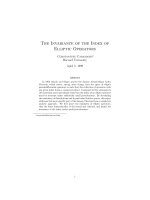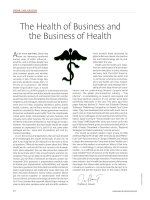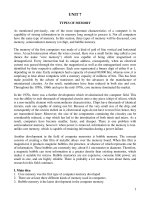Tài liệu The Genius of Scotland docx
Bạn đang xem bản rút gọn của tài liệu. Xem và tải ngay bản đầy đủ của tài liệu tại đây (611.51 KB, 169 trang )
The Genius of Scotland, by Robert Turnbull
The Project Gutenberg eBook, The Genius of Scotland, by Robert Turnbull
This eBook is for the use of anyone anywhere at no cost and with almost no restrictions whatsoever. You may
copy it, give it away or re-use it under the terms of the Project Gutenberg License included with this eBook or
online at www.gutenberg.org
Title: The Genius of Scotland or Sketches of Scottish Scenery, Literature and Religion
Author: Robert Turnbull
Release Date: February 10, 2012 [eBook #38822]
Language: English
Character set encoding: ISO-8859-1
***START OF THE PROJECT GUTENBERG EBOOK THE GENIUS OF SCOTLAND***
E-text prepared by Juliet Sutherland, Mary Meehan, and the Online Distributed Proofreading Team
()
THE GENIUS OF SCOTLAND;
Or
The Genius of Scotland, by Robert Turnbull 1
Sketches of Scottish Scenery, Literature and Religion.
by
REV. ROBERT TURNBULL
FOURTH EDITION.
New York: Robert Carter, 58 Canal Street 1848.
Entered, according to Act of Congress, in the year 1847, by Robert Carter, In the Clerk's Office of the District
Court of the United States for the Southern District of New York.
Stereotyped by Thomas B. Smith, 216 William Street, New York
PREFACE.
Having been born and educated in Scotland, and possessing a tolerable acquaintance with its History and
Literature, the Author of the following Work felt that he had some facilities for giving to the people of this
country a just idea of his native Land. The plan of his work is somewhat new, combining in a larger degree,
than he has hitherto seen attempted, descriptions of Scenery, with Literary and Biographical Sketches,
portraitures of character social and religious, incidents of travel, and reflections on matters of local or general
interest. Hence he has omitted many things which a mere tourist would not fail to notice, and supplied their
place with sketches of more enduring interest. He would particularly invite attention to the sketches of Knox,
Burns, Wilson, Chalmers, Bruce, 'The Ettrick Shepherd,' and Sir Walter Scott. His rambles through fair or
classic scenes are thus enlivened with useful information. In a word, it has been his endeavor, in an easy
natural way, to give his readers an adequate conception of the Scenery, Literature, and Religion of Scotland.
HARTFORD, CONN.
CONTENTS
PAGE
Preface 1
The Genius of Scotland, by Robert Turnbull 2
CHAPTER I.
Beauty an Element of the Mind Our Native Land Auld Lang Syne General Description of Scotland Extent
of Population Spirit of the People The Highlands The Lowlands Burns's 'Genius of Scotland' Natural and
Moral Aspects of the Country 'The Cotter's Saturday Night' Sources of Prosperity 11
CHAPTER I. 3
CHAPTER II.
The city of Edinburgh Views from Arthur's Seat The Poems of Richard Gall 'Farewell to
Ayrshire' 'Arthur's Seat, a Poem' Extracts Craigmillar Castle The Forth, Roslin Castle and the Pentland
Hills Liberty 32
CHAPTER II. 4
CHAPTER III.
Walk to the Castle The Old Wynds and their Occupants Regalia of Scotland Storming of the Castle Views
from its Summit Heriot's Hospital Other Hospitals St. Giles's Cathedral Changes The Spirit of
Protestantism 42
CHAPTER III. 5
CHAPTER IV.
John Knox's House History of the Reformer His Character Carlyle's View Testimony of John Milton 53
CHAPTER IV. 6
CHAPTER V.
Edinburgh University Professor Wilson His Life and Writings, Genius and Character 62
CHAPTER V. 7
CHAPTER VI.
The Calton Hill Burns's Monument Character and Writings of 'the Peasant Poet' His Religious
Views Monument of Professor Dugald Stewart Scottish Metaphysics Thomas Carlyle 77
CHAPTER VI. 8
CHAPTER VII.
Preaching in Edinburgh The Free Church Dr. Chalmers A Specimen of his Preaching The Secret of his
Eloquence 99
CHAPTER VII. 9
CHAPTER VIII.
Biographical Sketch of Dr. Chalmers 113
CHAPTER VIII. 10
CHAPTER IX.
Dr. John Brown of Edinburgh Rev. John Brown of Whiteburn Professor John Brown of Haddington Rev.
Dr. Candlish Specimen of his Preaching 126
CHAPTER IX. 11
CHAPTER X.
Ride into the Country The Skylark Poems on the Skylark by Shelley and the 'Ettrick
Shepherd' Newhall 'The Gentle Shepherd' Localities and Outlines of the Story Its Popularity in Scotland
138
CHAPTER X. 12
CHAPTER XI.
Biographical Sketch of Allan Ramsay Lasswade Ramble along the banks of the North Esk Glenesk A
Character Anecdote of Sir Walter Scott Hawthornden Drummond, the Poet His Character and
Genius Sonnets Chapel and Castle of Roslin Barons of Roslin Ballad of Rosabella Hunting Match
between Robert Bruce and Sir William St. Clair 157
CHAPTER XI. 13
CHAPTER XII.
Ramble through the Fields Parish Schools Recollections of Dominie Meuross The South Esk Borthwick
and Crichtoun Castles New Battle Abbey Dalkeith Residence of the Duke of Buccleugh 'Scotland's
Skaith,' by Hector Macneil His Character and Writings Extracts from the 'History of Will and Jean' 183
CHAPTER XII. 14
CHAPTER XIII.
City of Glasgow Spirit of the Place Trade and Manufactures The Broomielaw Steam George's
Square Monuments to Sir Walter Scott, Sir John Moore, and James Watt Sketch of the Life of
Watt Glasgow University Reminiscences Brougham Sir D. K. Sandford Professor Nichol and
others High Kirk, or Glasgow Cathedral Martyrdom of Jerome Russel and John Kennedy 197
CHAPTER XIII. 15
CHAPTER XIV.
The Necropolis Jewish Burial Place Monument to John Knox Monuments of William Macgavin and Dr.
Dick Reminiscences Character and Writings of Dr. Dick Pollok and 'the Course of Time' Grave of
Motherwell Sketch of his Life His Genius and Poetry 'Jeanie Morrison' 'My Heid is like to rend,
Willie' 'A Summer Sabbath Noon' 209
CHAPTER XIV. 16
CHAPTER XV.
Dumbarton Castle Lochlomond Luss Ascent of Benlomond Magnificent Views Ride to
Loch-Katrine Rob Roy Macgregor 'Gathering of Clan Gregor' Loch-Katrine and the Trosachs The City of
Perth Martyrdom of Helen Stark and her husband 231
CHAPTER XV. 17
CHAPTER XVI.
Sabbath Morning 'The Sabbath,' by James Grahame Sketch of his Life Extracts from his Poetry The
Cameronians 'Dream of the Martyrs,' by James Hislop Sabbath Morning Walk Country Church The Old
Preacher The Interval of Worship Conversation in the Church-yard Going Home from Church Sabbath
Evening 244
CHAPTER XVI. 18
CHAPTER XVII.
Lochleven Escape of Queen Mary from Lochleven Castle Michael Bruce Sketch of his
Life Boyhood College Life Poetry 'Lochleven' Sickness 'Ode to Spring' Death 'Ode to the Cuckoo'
260
CHAPTER XVII. 19
CHAPTER XVIII.
Dunfermline Ruins of the Abbey Grave of Robert Bruce Malcolm Canmore's Palace William Henryson,
the poet William Dunbar Stirling Castle Views from its Summit City of Stirling George Buchanan and
Dr. Arthur Johnston Falkirk Linlithgow Story of the Capture of Linlithgow Castle Spirit of War Arrival
in Edinburgh 284
CHAPTER XVIII. 20
CHAPTER XIX.
Journey to Peebles Characters Conversation on Politics Scottish Peasantry Peebles 'Christ's Kirk on the
Green' A Legend An old Church The Banks of the Tweed Its ancient Castles The Alarm Fire Excursion
to the Vales of Ettrick and Yarrow Stream of Yarrow St. Mary's Lake and Dryhope Tower 'The Dowie
Dens of Yarrow' Growth of Poetry Ballads and Poems on Yarrow by Hamilton, Logan and Wordsworth 295
CHAPTER XIX. 21
CHAPTER XX.
Hamlet and Church-yard of Ettrick Monument to Thomas Boston Birth-place of the Ettrick
Shepherd Altrieve Cottage Biographical Sketch of the Ettrick Shepherd The Town of Selkirk Monument
to Sir Walter Scott Battle-field of Philiphangh 319
CHAPTER XX. 22
CHAPTER XXI.
Return to the Banks of the Tweed Abbotsford The Study Biographical Sketch of Sir Walter Scott His
Early Life Residence in the Country Spirit of Romance Education First Efforts as an Author Success of
'Marmion' Character of his Poetry Literary Change His Novels Pecuniary Difficulties Astonishing
Efforts Last Sickness Death and Funeral 334
CHAPTER XXI. 23
CHAPTER XXII.
Melrose Abbey The Eildon Hills Thomas the Rhymer Dryburgh Monuments to the Author of 'The
Seasons' and Sir William Wallace Kelso Beautiful Scenery A Pleasant Evening Biographical Sketch of
Leyden, Poet, Antiquary, Scholar and Traveller The Duncan Family Journey Resumed Twisel
Bridge Battle of Flodden Norham Castle Berwick upon Tweed Biographical Sketch of Thomas Mackay
Wilson, author of 'The Border Tales' Conclusion 'Auld Lang Syne' 351
GENIUS OF SCOTLAND.
CHAPTER XXII. 24
CHAPTER I.
Beauty an Element of the Mind Our Native Land Auld Lang Syne General Description of Scotland Extent
of Population Spirit of the People The Highlands The Lowlands Burns's 'Genius of Scotland' Natural and
Moral Aspects of the Country 'The Cotter's Saturday Night' Sources of Prosperity.
The theory has become prevalent among philosophers, and even among literary men, that beauty is more an
element of the mind than of external objects. Things, say they, are not what they seem. Their aspects are ever
varying with the minds which gaze upon them. They change even under the eyes of the same individuals. A
striking illustration of this may be found in the opening stanza of Wordsworth's Ode to Immortality.
There was a time when meadow, grove and stream, The earth and every common sight To me did seem
Apparelled in celestial light, The glory and the freshness of a dream. It is not now as it hath been of yore; Turn
wheresoe'er I may, By night or day, The things which I have seen I now can see no more.
It is the mind then, which transfers its own ethereal colors to the forms of matter, and invests scenes and
places with new and peculiar attractions. Like the light of the moon streaming through a leafy grove and
transforming its darkness into its own radiant beauty, the spirit of man diffuses its own inspiration through the
universe,
"Making all nature Beauty to the eye and music to the ear."
Now if this theory be true, it follows that no country will appear to us so beautiful as the one which happens to
be endeared to our hearts by early recollections and pleasant associations. No matter how rude and wild, that
spot of all others on earth, will appear to us the sweetest and most attractive! 'New England,' says a native of
Massachusetts or of Vermont, 'is the glory of all lands. No hills and vales are more picturesque than hers, no
rivers more clear and beautiful.' 'Visit Naples, and die!' exclaims the Neapolitan, proud of his classic home.
'Green Erin, my darling,' is the fond language of the Hibernian, 'first gem of the ocean, first flower of the sea.'
'Here's a health,' shouts the native of Caledonia, 'bonny Scotland to thee!' Others may speak disparagingly of
the sour climate and barren soil of Scotland; but to a native of that country, the land of his fathers is invested
with all the charms of poetry and romance. Every spot of its varied surface is hallowed ground. He sees its
rugged rocks and desolate moors mantled with the hoary memories of by-gone days, the thrilling associations
of childhood and youth. Therefore, with a meaning and emphasis, which all who love their native land will
appreciate, he appropriates the words of the poet:
Land of the forest and the rock, Of dark blue lake and mighty river, Of mountains reared aloft to mock, The
storm's career, the lightning's shock, My own green land forever! Land of the beautiful and brave! The
freeman's home, the martyr's grave! The nursery of giant men, Whose deeds have linked with every glen, The
magic of a warrior's name!
Does not Scotland, however inferior, in some respects it may be deemed to other lands, possess a peculiar
charm to all cultivated minds?[1] What visions of ancient glory cluster around the time-honored name! What
associations of 'wild native grandeur,' of wizard beauty, and rough magnificence. What gleams of 'poetic
sunlight,' what recollections of martial daring by flood and field, what hallowed faith and burning
zeal, what martyr toils and martyr graves, monuments of freedom's struggles and freedom's triumphs in moor
or glen, what 'lights and shadows' of love and passion, what ancient songs, echoing among the hills, what
blessed sabbath calm, what lofty inspiration of the Bible and covenant, in a word, what dear and hallowed
memories of that 'Auld lang syne,' indigenous only to Scotland, though known throughout the world! Should
this be deemed enthusiastic, let it, and all else of a similar character which may be found in this volume, be
ascribed to a natural and not unpardonable feeling on the part of the writer. The remembrance of 'Auld lang
syne' can never be extinguished. Except the hope of heaven, it is our best and holiest heritage.
CHAPTER I. 25









